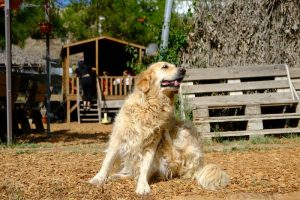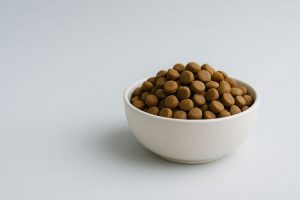Nowadays there is a huge range of dog food brands it is difficult to know what brand is right for your dog and what brands to avoid. In fact, some recommend that you change the main protein in your dog’s diet every few days!
With so many brands to compare it can be confusing to know what to look out for. If we are honest with ourselves, how often do you read through the ingredients of what our dog is eating?
Once we have found something that our dog eats any other considerations might go out the window. However, if your dog has a sensitive tummy, an allergy or is a puppy or senior dog you really should think a bit harder about what goes in their body.
READ MORE: The Right Age to Switch your Dog Food
In this article, we speak to the in-house veterinary surgeon at Pooch & Mutt, Dr Linda Simon, about the worst dog food brands in five categories:
- Dry food
- Sensitive stomachs
- Sensitive skin
- Puppies
- Seniors
Below, we give a brief overview of the type of food and Dr Simon gives her professional opinion on their nutritional value for dogs.
Dry Dog Food: Pedigree Vital
Dry food has been part of our dog’s diets since it was first invented in 1860 by James Spratt. It continued to increase in popularity over the years until the 1960s when ‘complete’ dog food was brought to the market.
Dry dog food is ideal for pet parents as it can be purchased in bulk and stored for long periods of time as well as offer all the nutrition a dog needs. The Pedigree brand is well-known and is the best-selling dog food brand in the UK, likely due to its price point rather than its quality.
Dr Linda Simon has this to say about Pedigree Vital:
“Dogs require a high-quality protein for muscle repair, as well as a healthy coat and skin, so ideally, a good quality dog food would have whole meat or fish as the first listed ingredient. This is not the case for Pedigree. Instead, Pedigree lists cereal as its first ingredient and only contains 7.2% meat as a whole.”
“The recommended carbohydrate percentage in dog food is 20-45%. This Pedigree food contains 82% carbohydrates, which could lead to significant weight gain in dogs, not to mention other issues such as difficulty building muscle, passing more stools, experiencing more digestive problems and sluggishness.”
“Dogs require a high-meat diet to get the nutrients they need, and Pedigree’s focus on cereal and carbs alongside a very low meat content makes it less favourable compared to some other brands.”

Sensitive Stomachs: Hills Science Plan Perfect Digestion Adult 1+
As much as we love our dogs, a dog with a sensitive stomach makes it very clear. In fact, there are some dog breeds that are picky with food due to sensitive stomachs or other issues.
Signs of a sensitive stomach in your dog include:
- Diarrhoea
- Constipation
- Bloatedness
- Farts/gas
Whether it is navigating their poo on a walk, or being hit by a blast of wind in the evening, for all their love and affection a dog with a sensitive stomach can make life unpleasant. So, you need them to have good dog food to help aid digestion.
Dr Simon has identified Hills Science Plan Perfect Digestion Adult 1+ as particularly bad, here’s why:
“The ideal food for dogs with sensitive tummies avoids too many carbs, as that can lead to obesity, diabetes and other chronic medical issues. Some nutritionists also advise against grains and wheat, as many dogs find them hard to digest. Hill’s contains an excess of carbs in its ingredients list – including wheat, maize, rice and oats.”
“In reality, the best core ingredient for a gut-friendly dog food would be a whole, lean protein which helps build the dog’s digestive system with its anti-inflammatory effects, instead Hills main ingredients are wheat and maize.”
“Lots of dogs can digest all kinds of food, but if your dog has a sensitive stomach, you’ll want to be more careful and choose gentle, digestible ingredients, something that unfortunately, this Hills Science food does not particularly offer.”
Sensitive Skin: Royal Canin Skin Care
A dog with sensitive skin is difficult to handle for dog owners. It is impossible to control behaviours like scratching sore skin, so we need to turn to other means. Subsequently, adjusting our dog’s diet is an excellent way to help manage a skin condition.
The most common cause of sensitive skin is allergies. But how do you know if your pooch has a skin issue? Here is a quick rundown of the signs of sensitive skin:
- Excessive scratching
- Dry and flaky skin
- Hair loss
- Inflamed skin
Speak to your vet about treatments that can help your dog, but one thing to try is changing your dog’s diet.
Dr Simon recommends avoiding Royal Canin Skin Care and explains why:
“One of the big perks of feeding your dog the right diet is that it can contribute to comfortable skin that’s free of itchiness and a smooth, shiny coat. Many dogs with sensitive skin have allergies – to grain or otherwise – so dog foods that contain grain will be riskier for them.”
“Royal Canin has maize, gluten and rice as its first three ingredients when protein rather than carbs are of more benefit to a dog’s diet.”
“Dogs with sensitive skin benefit from supplements for skin and hydration. Collagen as well as omega fatty acids are great examples of this. Royal Canin does actually include omega fatty acids which are great to reduce inflammation. However, a dog with sensitive skin often has allergies, so foods full of grains – such as Royal Canin’s – could be seen as riskier, so I would be cautious in choosing this food to help with your dog’s sensitive skin.”
For Puppies: Harrington’s Puppy
Getting a puppy is probably a big reason why most families get dogs. They may be cute and fun to play with, but they are still babies so require extra attention to their diets. Similar to babies, puppies have delicate stomachs, coupled with most dogs growing to full size within a year you need to carefully consider the food they eat.
When you get any dog there are a few weeks and months of discovery. You should have a few questions when feeding your puppy:
- Does the food suit them?
- If not, what ingredients could be affecting them?
- How can you manage their diet to avoid skin and stomach issues in the future?
- What food is best for healthy growth?
The first year of your puppy’s life will determine their long-term health, and their food is a huge part of that.
Dr Linda Simon has identified Harrington’s Puppy as a dog food brand which is a poor choice for puppies. Here’s why:
“Getting the food right for young pups is super important – they need all the extra nutrients and whole foods they can get to develop strong bones and muscles as they rapidly grow. Alongside this, the right food needs to be gentle on their small, delicate tummies.”
“The first ingredient in Harrington’s is ‘meat meal’ – a powder made from animal parts that humans don’t consume. As it’s created by rendering, this can affect nutrient bioavailability, meaning many of the important nutrients can be lost.”
“It’s key to know exactly what you’re feeding puppies so that if they react badly to a meal, you can clearly read the label to investigate the ingredients. The nutritional information of Harrington’s is vague – it’s unclear which meats are included. This means the contents could change over time and cause a reaction or digestive issues in your pup.”
For Seniors: Bakers Senior
A senior dog needs to be looked after. They might still act like a puppy but their body is unable to process food, in the same way, to avoid becoming overweight. An overweight old dog puts extra pressure on their joints and limbs increasing the likelihood of arthritis.
Older dogs should be given extra supplements and nutrients to assist with movement, organ function and overall quality of life. A lot of this should be found in their food.
Dr Simon explains why Bakers Senior is not the best dog food brand for your senior dog:
“Much like puppies, senior dogs need special care when being fed – their diets must be gentle on the stomach yet full of whole ingredients to keep them nourished, lean and spritely in this late stage of life.”
“Bakers contains a very low proportion of meat at 5.1%, which is not clearly labelled, and listed as ‘Meat and animal derivatives”.
“As a senior dog is less active than a younger dog and their metabolism has slowed, they shouldn’t eat too many carbs wherever possible. Senior dogs who are overweight have a worse quality of life and tend to pass away months, or even years sooner than slender, healthier dogs. Bakers contains an excessive amount of carbohydrates, at 52% wholegrains.”
“Finally, to help a senior dog have the best quality of life, the addition of supplements and nutraceuticals can have a positive impact on their ageing body and functions. Bakers contains no supplements or nutraceuticals, so whilst this might taste great to your pooch, it really won’t be offering them much support in terms of their ageing joints and body.”






